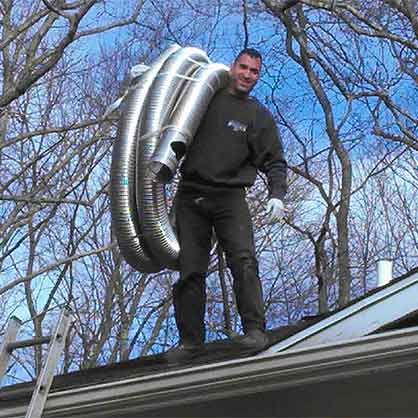Why Chimney Relining May be Your Only Option
Your chimney liner is absolutely critical to the safety of your heating system. Most masonry chimneys were built with an inner liner of clay tiles. Chimney liners may also be constructed out of a cast masonry mix, aluminum or stainless steel. The purpose of this liner is to keep the hot gases inside the chimney so that it does not overheat and ignite the combustible material nearby, such as the framing and walls of your house. Any openings in the chimney liner can potentially cause serious problems.
Clay tile liners will definitely crack and break down over time, letting in moisture that will cause structural problems. The sulfur in smoke can also mix with moisture, causing a corrosive reaction that can eat small holes in metal liners. To keep your chimney safe, it is critical that you have a secure inner lining system to keep carbon monoxide, moisture, creosote, smoke and other dangerous products from seeping through the bricks and mortar and leaking into your home.

Whether you need to add a chimney liner that was never installed, replace an improperly installed liner or rebuild a liner that has been damaged or destroyed, Total Chimney Care can help. We will rebuild your liner using the highest quality stainless steel chimney liner material, leaving you with peace of mind, knowing that you can safely enjoy your chimney for years to come.
Relining Alternatives
For metal liners that need replacing, stainless steel liners are the best. They have a lifetime warranty and should be installed by a fully trained, professional chimney technician. Make sure to check that the person or company who is doing the installation will not cause you to lose your warranty.
Most of the metal flues that are replaced today are aluminum or galvanized and neither one of these has a warranty associated with them, so we do recommend the stainless steel. However, if you have a clay or mortar type flue you do have another alternative: HeatShield®, which is a “Cerfractory®” sealant material that restores the integrity of your chimney’s flue to vent hazardous flue gases from your home.”
You can find some additional information here but in a nutshell, the sealant is poured down onto a custom form for your flue that is pulled to the top by a wench, spreading the material evenly over the surface of the clay flue. This pushes the sealant into the crevices and cracks, thus restoring the inner liner of the flue. Watch the video below to learn more about HeatShield application.
Regardless of fuel-type, be it an oil flue, a wood flue, a gas flue, or a multi-fuel flue, our experts can recommend the right liner for you. Click here to read more about oil flues.
Call us to discuss what Total Chimney Care can do for you and ask about our “sweep you off your feet” guarantee!
Your fireplace and chimney masonry needs to be maintained to provide maximum safety in your home, and we can help with repair and installation to whatever degree is required.
